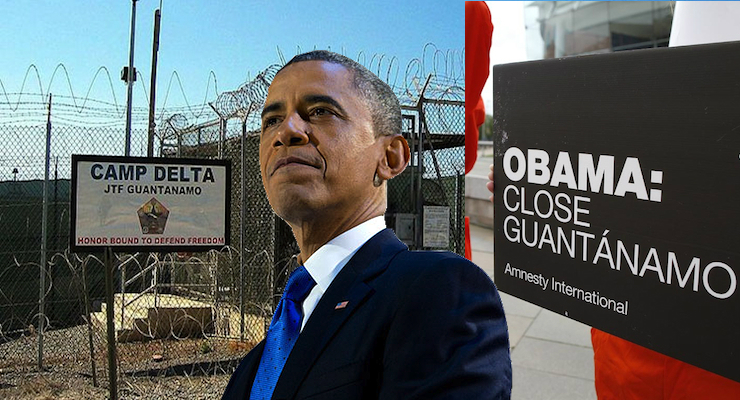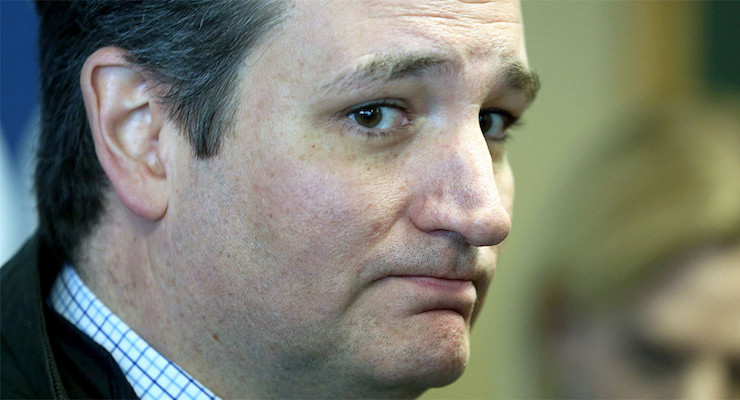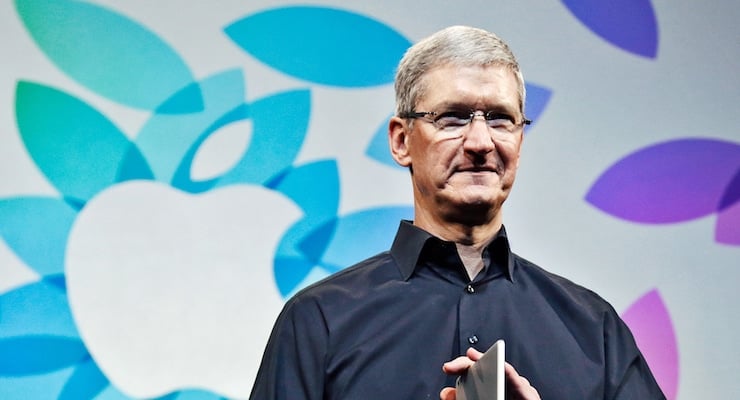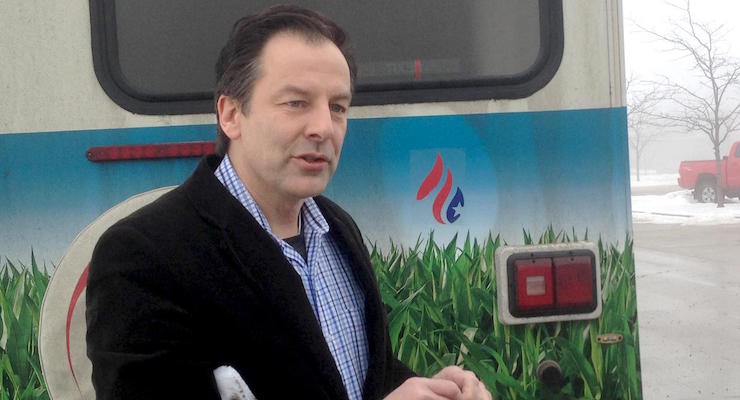Donald Trump Beat “The Geniuses”
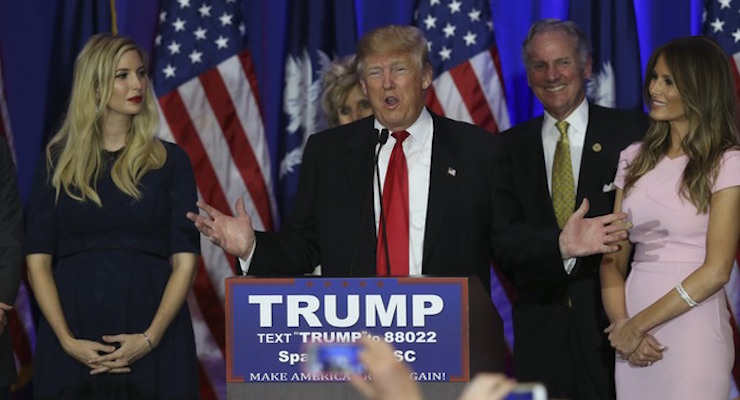
Donald Trump delivers his victory speech in Spartanburg, South Carolina on February 20, 2016. (Photo: Getty)
Media pundits, particularly in the Republican Establishment, have been pushing a strategic narrative that is flat-out false. Their argument is an attempt to downplay the frontrunner’s dominant performance in the first three voting states by cherry-picking data and disguising wishful thinking as political punditry.
But the reality is that Donald J. Trump can win an outright majority of delegates with a rather small plurality of the Republican primary vote. In fact, he can win with as little as a third of the vote. By using the results in Iowa, New Hampshire and South Carolina, our model can confidently predict that Trump would win a majority of delegates as long as he stays above 31% of the vote.
That said, even slightly less may not stop him depending on the dynamics of the field.
Because this claim was called into question by John Fund at National Review, we will explain the model and numbers in the context of his most recent analysis in an article published on Monday. To be fair, I criticized his analysis first via Twitter, which I will not only show to be inaccurate but borderline delusional.
Trump could win with less than 40% of the vote in a three-way race (39% to be exact) and with an even smaller plurality if the field remains split by four or more. I will explain a few state scenarios that are winner-take-all, winner-take-most and proportional, as well as how the rules impact the delegates. But there is another whole side to the anti-Trump argument Mr. Fund mentioned that first needs to be addressed.
Fund claim #1:
That [winner-take-all] will propel him to the nomination, they believe. But not a single state is winner-take-all until Florida (99 delegates) and Ohio (66 delegates) vote on March 15. With Jeb Bush’s dropping out, Marco Rubio probably has an advantage over Trump in his home state, as does John Kasich in Ohio. Kasich is likely to stay in the race in hopes he can use his delegates to become a power broker at the GOP convention in Cleveland in July.
Now, let’s come back down to Earth.
Even if Jeb Bush’s supporters–both donors and voters–defy statistical realities and get behind Rubio 100%, polls suggest he’ll still lose his own state to Trump by at least 20 points, roughly 40% to 22%. Since Florida is winner-take-all Mr. Trump can win with just 1 vote and we can put those 99 delegates in The Donald’s column.
In Ohio, where Mr. Fund is banking on an establishment candidate and favorite son, all 66 delegates to the Republican National Convention are also pledged on a winner-take-all basis. Trump leads in the Buckeye State by an average 5 points but again only has to win by 1 vote to take all 66 delegates. Due to the support for his positions on immigration and trade–both issues that have disproportionately hurt blue-collar, working class voters–he will.
These two blocs, which Trump carries overwhelmingly, will make up a significant number of voters in the Ohio Republican primary electorate and, indeed, across the SEC states on March 1.
“Not even native son Gov. John Kasich can stop the Donald Trump steamroller,” said Peter A. Brown, assistant director of the Quinnipiac University Poll.
Fund claim #2:
The calendar and the way the state contests are organized basically mean that in order to win a majority of delegates by the beginning of June, a single candidate would have to have won more than 45 percent of the popular vote.
That’s just not supported by the delegate math. It’s incorrect and was proven to be on Saturday when Mr. Trump made the Palmetto State winner-take-all. The Republican Establishment pundits have chosen to focus on the makeup of the anti-Trump vote and they have failed to understand the reality of his broad-based appeal. It does not at all reflect the stereotype and allows him to compete (and win) in the North, the South, the Midwest and West.
Let’s get a bit more specific.
Many of the states that award delegates proportionally–including several of the largest, delegate-rich states–award to candidates who exceed a certain share of the vote. It’s called a “delegate threshold” and many proportional states award delegates only to these candidates who exceed that mark.
While many states use 20% of the vote, which only Mr. Trump has consistently proven he can meet, others vary and all give the frontrunner an opportunity to pull away in the delegate race fairly quickly.
It’s called a “back-door” winner-take-all, which we predicted a few weeks ago in the Palmetto State and were ultimately proven correct on Saturday. Basically, Trump appeals across the board demographically speaking and it allows him to carry rural, urban and diverse suburban districts and counties. And it’s not just South Carolina, which is less favorable than those in the Northeast.
For instance, on April 19, it is very possible Mr. Trump take all but one of the 95 delegates in his own home state of New York. In the Empire State, 81 district delegates are bound to the vote in each of the state’s 27 congressional districts, each offering 3 a piece. However, if Mr. Trump wins more than 50% or he is the only candidate to receive 20% or more of the vote, he takes all 3 delegates. That’s what the outdated (and understated) polls indicate.
The remaining 15 delegates–10 base at-large delegates plus 1 bonus delegate–are allocated at a state committee meeting. If a candidate receives more than 50% of the vote, that candidate receives all 14 delegates. We fully expect Trump to do just that and, once again, force a “winner-take-most” hybrid into a winner-take all.
Nevertheless, as of now, Trump has 67 delegates and needs 1,237 delegates to win the party’s nomination by the end of the primary process. Ted Cruz has only 11, leaving 10 for Marco Rubio, 5 for John Kasich and 3 for Ben Carson. There are 30 delegates up from grabs in Nevada, where polling stinks but Trump has a large lead, and we believe he will get at the very least 12. For the sake of argument here, let’s say 79.
Of the remaining delegates, 55% (1,360 delegates) are allocated proportionally and 16% are winner-take-all. Again, the number of total delegates varies depending on our 31% to 41% of the vote model, but even if we assume Trump gets just 31% of these proportional delegates, his delegate share will be roughly 421. To be clear, we believe it is highly likely–partly because of the rules we just outlined and partly because his national polling average is higher (33%)–Trump will get more delegates than we are estimating here.
But I thought I would be generous.
Now, the winner-take-most hybrid contests–not unlike his own home state–will work against Mr. Trump because he will not get many pledges from establishment elite delegates unbound to the vote. But even if we give him zero of these, reduce his national number to 30% to account for proportional delegates, as well as half of the winner-take-all, he still takes 412 of the 618 available.
Including Florida and Ohio–as well as the 25 delegates from Connecticut, which uses an extraordinary set of rules–Trump will take 396 delegates from the winner-take-all states. Is there anyone who is going to argue he’ll not take the 42 delegates in Wisconsin after he takes Ohio, particularly considering his strength among the state’s key demographics?
Just in case you’ve lost track, Trump is already at 1308 delegates in this rather conservative scenario, more than he needs to go on to face the Democratic nominee (we believe Hillary Clinton) in November. That’s the low end of the math, but the reality for the anti-Trump establishment crowd. As I’ve just explained over-and-over, the over-simplified model is more than likely understating his total delegate count at the end of the process.
Fund wasn’t arguing that Mr. Trump wasn’t the frontrunner, just that he wasn’t inevitable. Unfortunately, for those who don’t want him to be the nominee, The Donald has history, the momentum and the data on his side.
